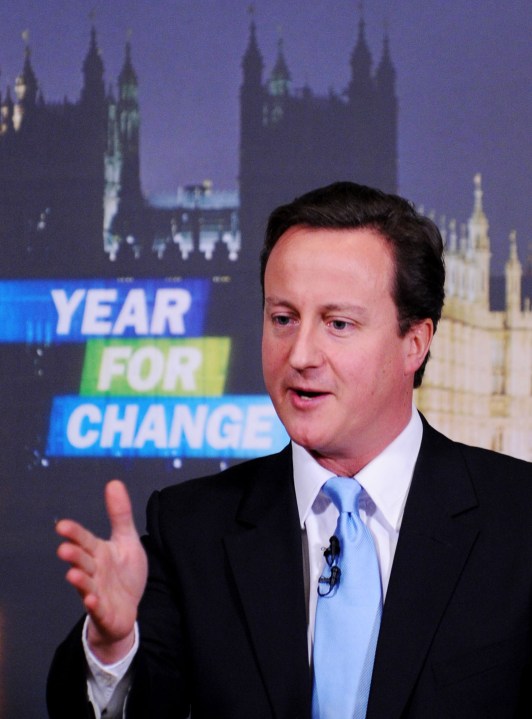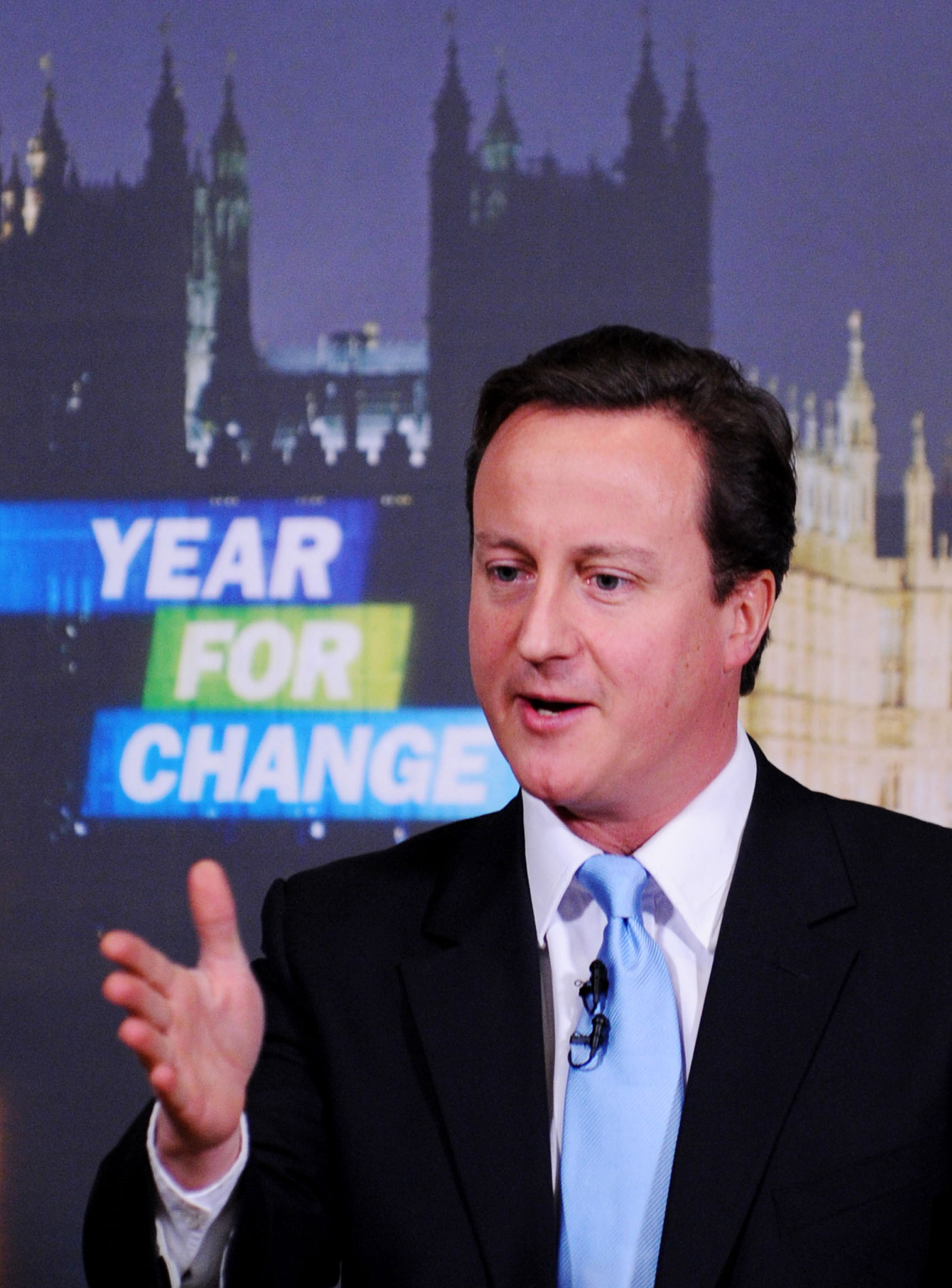 David Cameron can give rousing, mature, insightful speeches. Yesterday’s was not one of them. It used the word ‘hope’ 7 times and ‘change’ 27 times and that, I suspect, was its entire purpose – because there was precious little content in it otherwise. In the News of the World today, I describe the speech as vapid nonsense. Here’s ten extracts which show why.
David Cameron can give rousing, mature, insightful speeches. Yesterday’s was not one of them. It used the word ‘hope’ 7 times and ‘change’ 27 times and that, I suspect, was its entire purpose – because there was precious little content in it otherwise. In the News of the World today, I describe the speech as vapid nonsense. Here’s ten extracts which show why.
1. “It’s because we are progressives that we will protect the NHS…We recognise its special place in our society so we will not cut the NHS; we will improve it for everyone.” Come again? Refusing to cut the NHS reflects its ‘special place’? Herewith the poisoned logic of Brown: that love means never having to say ‘cut’. If you cut, you don’t care. If you care, you don’t cut. Since 1994, this has been Brown’s verbal snare – and I had hoped that Cameron would wriggle free from it. Using Cameron’s own logic in the above statement: he will cut the education and military budget in office (though he won’t admit it yet) – but what does that say? Doesn’t our military have a ‘special place’ in society? Don’t our schools? It isn’t clever to steal Labour’s rhetoric. It conveys the sense of being ideologically muddled, and concerned with opportunism rather than political principle.
2. He promises “a new high-speed rail network” – paid for by what? With £180bn deficit, there is no room for discretionary costly schemes like this and it is disingenuous to suggest otherwise.
3. “We need to build an enterprise economy” – so why deter entrepreneurs with a revenue-destroying 50p tax that even Brown wasn’t stupid enough to introduce until his last month in office? The top rate of tax is a totemic signal of a country’s approach to wealth – and, in keeping 50p, the Tories would leave Britain with the third highest top rate in the world. This will speak louder than any pro-enterprise speech Osborne makes, one of the many reasons why 50p is such a bad idea.
4. “We have argued for fiscal responsibility from day one of my leadership” – em, no, they signed up to Gordon Brown’s spending plans, which is something rather different. Less said about that the better.
5. “We have been clear about where some of the cuts will come from.” To be specific, he has been specific about £7bn – and he will face a budget deficit of about £180bn in 2010-11. So he has been specific about 4 percent of the gap. No one has been given a clue how he’d close the rest of that gap, and he should not pretend otherwise.
6. “And I can announce today that if we win this year’s election, I will invite leaders of the main opposition parties to attend the war cabinet on a regular basis so they can offer their advice and insights.” What does Cameron think the purpose of a war cabinet is? What great insight would Ed Balls or Harriet Harman have to bring on our campaign in Afghanistan? Or Nick Clegg, who is soon preparing to call for withdrawal? More seriously, it suggests Cameron that is preparing for coalition – which doesn’t work in an adversarial political system like Westminster’s. A party wins, thanks to the way the votes are counted it wins big – and governs. Suggesting otherwise is preparing for coalition. It may reach the ‘middle ground’ between parties, but it won’t hit what Keith Joseph called the ‘common ground’ with voters. Cameron is aware of this distinction.
7. “We have opened up our party and have more women candidates and candidates from ethnic minorities ready to bring their expertise to help change this country.” This may sound good around the Shadow Cabinet table, but voters don’t see politicians and people in this tokenistic way. I wonder if Cameron knows how this infuriates the non-white and female candidates who are fighting for him. One told me he almost steered off the road in anger when hearing Theresa May on the radio refering to ‘BME candidates’.
8. “Since I started speaking today, more than half a million pounds has been added to our national debt.” I have to hand it to Cameron, I do like that line. He should use that more often.
9. “We will redistribute power from the political elite to the man and woman in the street.” This is a proper, radical and plausible Tory mission. But how would it be accomplished? This speech gives no clues. Too little was said about Cameron’s Swedish Schools policy, his only truly radical agenda. And with Lansley’s ‘back to Dobson’ policy on the NHS, there will be precious little power transferred in health. Of course, power is money: tax is the way power is stolen by the political elite, and tax cuts are the way of returning that power.
10. Perhaps the most dangerous line was Cameron saying that, under Labour, there would be ‘higher debts … higher taxes, higher interest rates” if Brown was re-elected. There will be all three under the Tories. National debt will increase by at least a quarter over the next parliament (that’s what ‘deficit’ means), VAT will rise to at least 20 percent, and base rates will almost certainly rise from their historic lows. What will Cameron tell the voters when they will face higher debt, tax and mortgages? It will look as if his economic plan has gone wrong – when, in fact, it is part of the plan. Voters really are mature enough to handle this information, if presented to them honestly.
Cameron has not yet found a way to convey, clearly and in simple terms, the better points of his agenda. He can do so much better than the above speech, which is why it annoyed me so much. The speech is aimed at sounding different to Gordon Brown: optimism against Brown’s pessimism, bipartisanship against Brown’s dividing lines etc. He should be contrasting Brown’s spin and obfuscation with his clear truth. An obsession with election tactics is retarding the development of a more coherent Tory message: the kind of message that Cameron can articulate well when he puts his mind to it (as he did in the conference speech).
Above all, he needs to be more honest about the economic pain to come. About what will happen, no matter who wins the election. One of Cameron’s most effective attack lines against Gordon Brown is saying that he is ‘taking the voters for fools’. As the Tories enter election mode, Cameron had best be very careful that he doesn’t do the same.
P.S. Stephan Shakespeare has written a post correcting me, saying that the beef lies in Cameron’s concept of a post-bureaucratic age – which he elaborates. I don’t disagree with Stephan, but again: if that’s what Cameron means, that’s what Cameron should say. The tragedy is that Cameron does have a substantial agenda – but one the Tories seems intent on disguising.








Comments